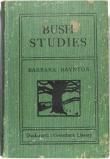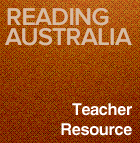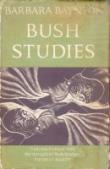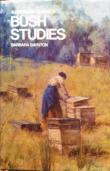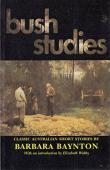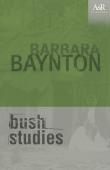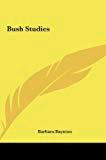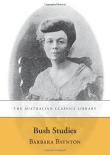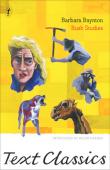AustLit
Latest Issues
AbstractHistoryArchive Description
'Bush Studies is famous for its stark realism—for not romanticising bush life, instead showing all its bleakness and harshness.
'Economic of style, influenced by the great nineteenth-century Russian novelists, Barbara Baynton’s short-story collection presents the Australian bush as dangerous and isolating for the women who inhabit it.' (Publication summary : Text Classics)
Reading Australia
This work has Reading Australia teaching resources.
Unit Suitable For
AC: Senior Secondary (English Unit 1)
Themes
Australia, Australian Bush, colonisation, connection to place, gender, hardship, isolation, resilience, women
General Capabilities
Critical and creative thinking, Ethical understanding, Information and communication technology, Literacy, Personal and social
Notes
-
Dedication: To Helen McMillen of Sydney New South Wales [in the copy presented by Baynton to Lord Tennyson, held in the National Library of Australia, this is corrected in Baynton's hand to 'McMillan'].
Affiliation Notes
-
Preppers and Survivalism in the AustLit Database
This work has been affiliated with the Preppers and Survivalism project due to its relationship to either prepping or prepper-inflected survivalism more generally, and contains one or more of the following:
1. A strong belief in some imminent threat
2. Taking active steps to prepare for that perceived threat- A range of activities not necessarily associated with ‘prepping’ take on new significance, when they are undertaken with the express purpose of preparing for and/or surviving perceived threats, e.g., gardening, abseiling.
- The plausibility of the threat, and the relative “reasonable-ness” of the response, don’t affect this definition. E.g., if someone is worried about climate change and climate disasters, and they respond by moving from a riverbank location in Cairns, or to a highland region of New Zealand, this makes them a prepper. If someone else is worried about brainwashing rays from outer space, and they respond by making a tinfoil hat, that makes them a prepper.
3. A character or characters (or text) who self-identify as a ‘prepper’, or some synonymous/modified term: ‘financial preppers’, ‘weekend preppers’, ‘fitness preppers’, etc.
Contents
- A Dreamer, single work short story (p. 1-14)
- Squeaker's Mate, single work short story (p. 15-43)
- Scrammy 'And, single work short story (p. 44-78)
- Billy Skywonkie, single work short story (p. 79-105)
- Bush Church, single work short story (p. 106-141)
-
The Chosen Vessel,
single work
short story
(p. 142-155)Following a similar thread to Henry Lawson's "The Drover's Wife" (and many believe, a direct response to it), "The Chosen Vessel" follows a young mother left alone in her outback hut who becomes growingly concerned for her own safety following the arrival of a menacing swagmen. The story also follows for a short time a man riding in to town to place his vote and his struggles with religious guilt.
- Memoir of Barbara Baynton, single work biography (p. 1-25)
- Barbara Baynton's Stories Barbara Baynton and the Dissidence of the Nineties, single work criticism (p. 26-42)
- A Dreamer, single work short story (p. 45-53)
- Squeaker's Mate, single work short story (p. 54-71)
- Scrammy 'And, single work short story (p. 72-92)
- Billy Skywonkie, single work short story (p. 93-109)
- Bush Church, single work short story (p. 110-131)
-
The Chosen Vessel,
single work
short story
(p. 132-140)Following a similar thread to Henry Lawson's "The Drover's Wife" (and many believe, a direct response to it), "The Chosen Vessel" follows a young mother left alone in her outback hut who becomes growingly concerned for her own safety following the arrival of a menacing swagmen. The story also follows for a short time a man riding in to town to place his vote and his struggles with religious guilt.
-
The Chosen Vessel,
single work
short story
Following a similar thread to Henry Lawson's "The Drover's Wife" (and many believe, a direct response to it), "The Chosen Vessel" follows a young mother left alone in her outback hut who becomes growingly concerned for her own safety following the arrival of a menacing swagmen. The story also follows for a short time a man riding in to town to place his vote and his struggles with religious guilt.
- Squeaker's Mate, single work short story
- Scrammy 'And, single work short story
- Bush Church, single work short story
- Billy Skywonkie, single work short story
- A Dreamer, single work short story
- Introduction, single work essay
Publication Details of Only Known VersionEarliest 2 Known Versions of
Other Formats
- Sound recording
Works about this Work
-
y
 Architectures of Occupation in the Australian Short Story : Literature and the Built Environment After 1900
London
:
Routledge
,
2024
27374606
2024
multi chapter work
criticism
Architectures of Occupation in the Australian Short Story : Literature and the Built Environment After 1900
London
:
Routledge
,
2024
27374606
2024
multi chapter work
criticism
'Patrick West’s Architectures of Occupation in the Australian Short Story cultivates the potential for literary representations of architectural space to contribute to the development of a contemporary politics of Australian post-colonialism.
'West argues that the predominance of tropes of place within cultural and critical expressions of Australian post-colonialism should be re-balanced through attention to spatial strategies of anti-colonial power. To elaborate the raw material of such strategies, West develops interdisciplinary close readings of keynote stories within three, female-authored, pan-twentieth century, Australian short-story collections: Bush Studies by Barbara Baynton (1902); Kiss on the Lips and Other Stories by Katharine Susannah Prichard (1932); and, White Turtle: A Collection of Short Stories by Merlinda Bobis (1999). The capacity of the short-story form to prompt creative and politically germinal engagements with species of space associated with architecture and buildings is underscored. Relatedly, West argues that the recent resurgence of binary thought—on local, national, and international scales—occasions an approach to the short-story collections shaped by binary relationships like a dichotomy of inside and outside. Concluding his argument, West connects the literary and architectural critiques of the story collections to the wicked problem, linked to ongoing colonial violences, of improving Australian Indigenous housing outcomes.
'Innovative and interdisciplinary, this book will be of interest to scholars and students of Literary, Architectural and Postcolonial Studies. .' (Publication summary)
-
Australien
2019
single work
criticism
— Appears in: Verdenslitteraturer : Introduktion til litteraturen uden for Europa 2019; (p. 253-284) -
(Re)claiming Barbara Baynton’s Gothic Creek : An Analysis of Gillian Mears’ Foals’ Bread and Jessie Cole’s Deeper Water
2017
single work
criticism
— Appears in: Etropic , vol. 16 no. 2 2017;'The creek is a threatening site for women in Barbara Baynton’s Bush Studies (1902). The female characters in her stories are routinely represented as vulnerable, drowning, or murdered at the creek, and the slippery banks and murky waters have been established by Baynton as an Australian gothic space where women (and their bodies) are denied agency. Gillian Mears and Jessie Cole are two contemporary writers who challenge Baynton’s representation of the gothic creek. The female protagonists in their most recent Australian gothic novels, Noah in Mears’ Foal’s Bread (2011) and Mema in Cole’s Deeper Water (2014), understand the creek as a subversive site that accommodates alternative female corporeal experiences. While Noah in Foal’s Bread finds body autonomy in her use of the creek as a birthing space for her firstborn child, Mema in Deeper Water experiences body empowerment in her use of the creek as a space of sexual awakening. Though the gothic creek is a fearful site for women in Baynton’s establishing Australian gothic text, Bush Studies, both Foal’s Bread and Deeper Water demonstrate that the contemporary gothic creek is able to (re)negotiated as a site of female body autonomy and empowerment.' (Publication abstract)
-
“The Distance between Them” : Sheep, Women, and Violence in Evie Wyld’s All the Birds, Singing and Barbara Baynton’s Bush Studies
2016
single work
criticism
— Appears in: Antipodes , June vol. 30 no. 1 2016; (p. 125-136) 'In recent years, animals in contemporary Australian writing and culture have been of considerable interest to scholars and writers. Anna Krien and Delia Falconer have raised questions about their ethical treatment and the preponderance of animal metaphors in Australian fiction and poetry in essays for general readers, while J. M. Coetzee's representation of dogs has been a significant area of recent inquiry in academic scholarship. Dogs' salience as metaphors in Disgrace (1999) has been noted by James Ley, as has the relationship between human and animal rights, embodiment and belief in Elizabeth Costello (2003) in essays by Elizabeth Anker and Fiona Jenkins. The recent interest in animals in the Australian context has also become manifest in a series of novels, many of them by women, such as Michelle de Kretser's The Lost Dog (2007), Eva Hornung's Dog Boy (2009), Gillian Mears's Foal's Bread (2012), Carrie Tiffany's Mateship with Birds (2012), and Charlotte Wood's Animal People (2011). ' (Introduction) -
"The Chosen Vessel" and the Ghost Wife
2016
single work
essay
— Appears in: Southerly , August vol. 76 no. 1 2016; (p. 144-168) ' In an interview in the Guardian in 2004, the renowned American author Annie Proulx spoke of her admiration for the work of a little known Australian writer called Barbara Baynton. The creator of Brokeback Mountain described how she was drawn to the work of another female writer whose work was "aesthetically rudimentary, but takes harshness, between men and women, and the land, to a painful level of implacability" (Edemariam). Proulx was referring specifically to her favourite Baynton short story, Squeaker's Mate, though her comments are applicable to almost every story in Baynton's Bush Studies (1902), a collection characterised by relentlessly unsentimental and brutal depictions of life in remote Australian locations in the late nineteenth and early twentieth centuries.' (Publication summary)
-
A Note On Barbara Baynton
1949
single work
review
— Appears in: Arts Quarterly , Summer 1949; (p. 8-13)
— Review of The Chosen Vessel 1896 single work short story ; Bush Studies 1902 selected work short story ; Squeaker's Mate 1902 single work short story ; Scrammy 'And 1902 single work short story ; Billy Skywonkie 1902 single work short story ; Bush Church 1902 single work short story ; Human Toll 1907 single work novel Discusses Barbara Baynton's 'bare objectivity' and 'treatment of subject matter' which, in Peter Cowan's view, 'tends to exclude the writer's personality'. -
Untitled
1903
single work
review
— Appears in: The Queenslander , 24 January 1903; (p. 187)
— Review of Bush Studies 1902 selected work short story -
Untitled
1903
single work
review
— Appears in: The Queenslander , 4 April 1903; (p. 748)
— Review of Bush Studies 1902 selected work short story -
Untitled
1903
single work
review
— Appears in: The Brisbane Courier , 31 January 1903; (p. 13)
— Review of Bush Studies 1902 selected work short story -
Welcome Reprints of Australian Classics
1993
single work
review
— Appears in: The Canberra Times , 20 February 1993; (p. C9)
— Review of The Watcher on the Cast-Iron Balcony : An Australian Autobiography 1963 single work autobiography ; Bush Studies 1902 selected work short story -
No Place for a Woman? : Barbara Baynton's Bush Studies
2003
single work
criticism
— Appears in: Journal of the Short Story in English=Les Cahiers de la Nouvelle , Spring vol. 40 no. 2003; (p. 85-96) 'Clearly, the risk taken by the author of excessive impicitness is the risk of being misunderstood. Susan Barrett argues that this has ... been the case for Barbara Baynton ... whose Bush Stories were until recently read as "true" accounts of life in the bush ' (Linda Collinge, Iintroduction to the Journal of the Short Story in English, 40 (2003) p.13). Barret re-examines the works in the light of feminist criticism, concluding that 'given the circumstances in which she was trying to publish, direct criticism was never an option for Baynton. What is essential in decoding Baynton's work is to accept that it is not about women but about the absence of women who are shown to be victims both of men in the bush and of language.' (p.95) -
Escaping the Bush Paradigm
2004
single work
criticism
— Appears in: Imagining Australia : Literature and Culture in the New New World 2004; (p. 53-65) -
Expulsion, Exodus and Exile in White Australian Historical Mythology
1999
single work
criticism
— Appears in: Journal of Australian Studies , no. 61 1999; (p. 1-18) Ann Curthoys examines 'how notions of exile and exodus permeate some key figures in Australian history, the convicts and pioneers' (3). She draws on historical works as well as fiction and film. In the second half of her essay she argues that the Mabo decision has reawakened non-Indigenous Australian's fear of homelessness. -
Untitled
1903
single work
column
— Appears in: The Queenslander , 21 February 1903; (p. 411) -
Untitled
1903
single work
column
— Appears in: The Queenslander , 14 March 1903; (p. 580)

